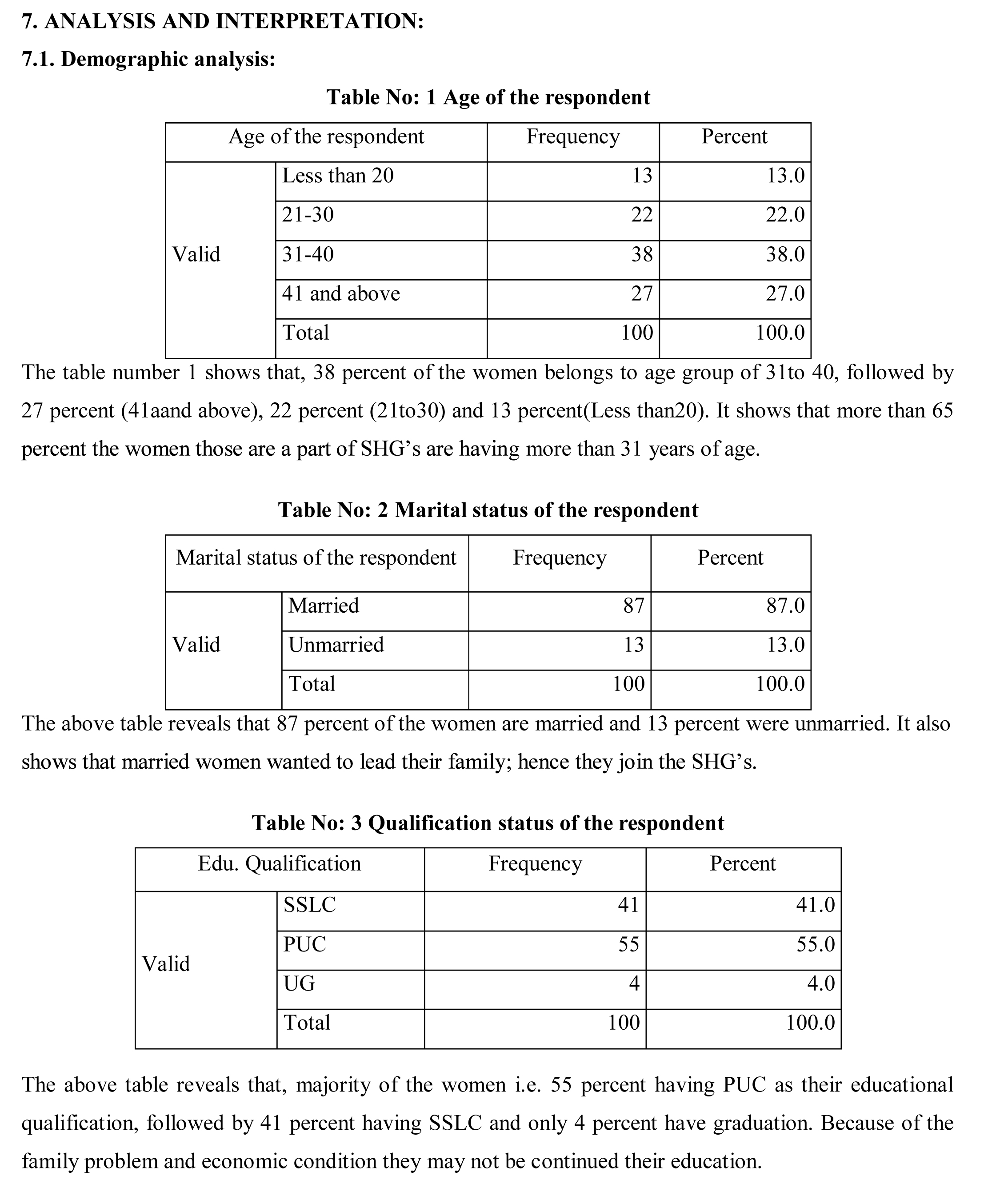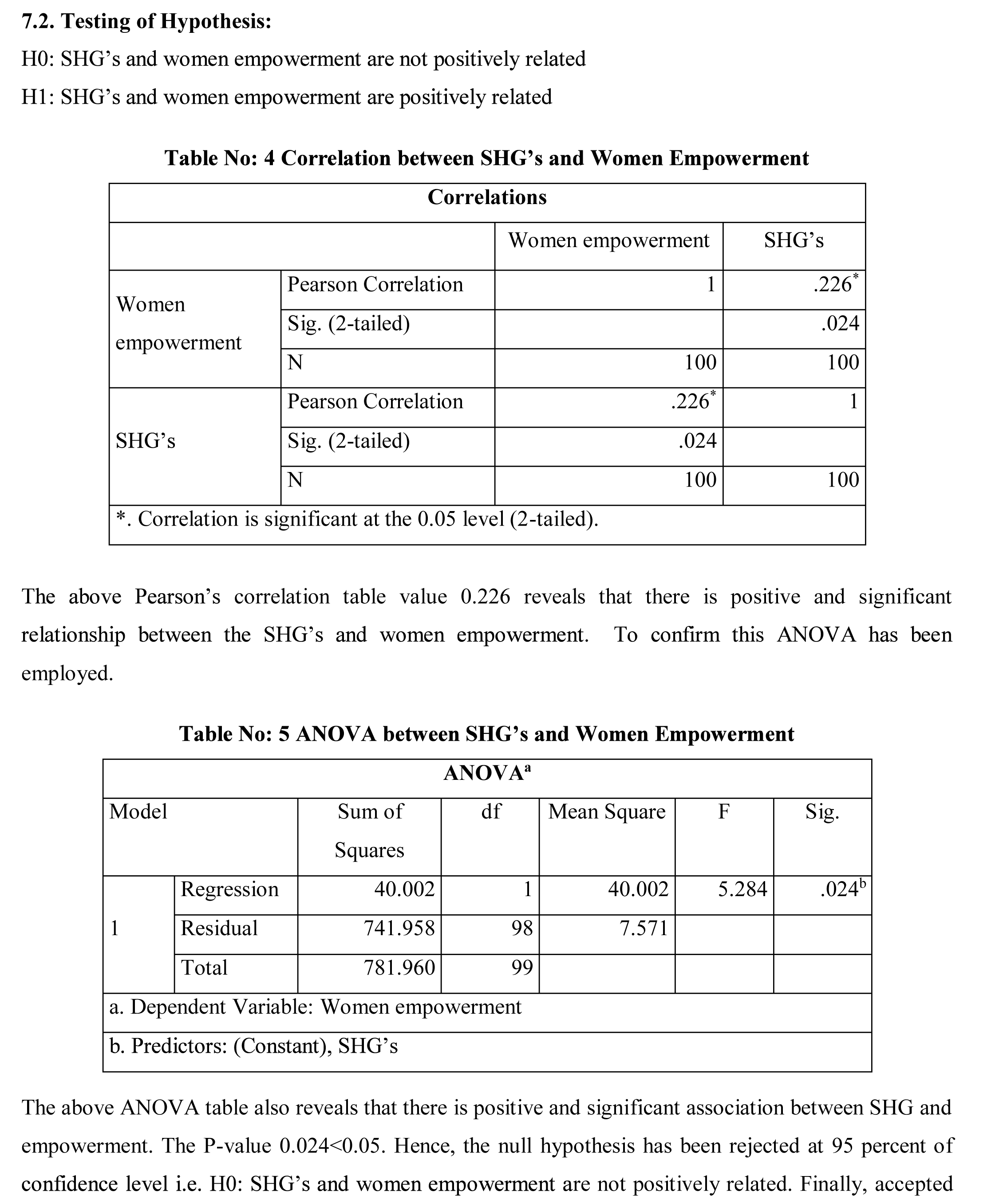Subscribe now to get notified about IU Jharkhand journal updates!
An Assessment Women Empowerment Through SHG’s
Abstract :
The women are facing numerous challenges to run their families in the rural areas. Some amongst them are financial problems, educational problems, social problems, and many more. As a result to conquer those problems the rural women have started SHG’s having saying that “All for one, one for all”. Then they started to gathering of people together to contribute small amount of money to solve their problems. That SHG’s have become sources of empowering rural women. Hence, this research work has conducted to appraise the relationship between the SHG’s and women empowerment. One hundred (100) rural women who are the part of SHG’s were concentrated in this study, and non-probabilistic convenient sampling method was used to pick the samples. The well thought-out questionnaire was used to collect the primary data. Secondary methods of data such as Articles, Journals, websites etc. were included for the gathering of the information.
Percentile analysis was utilized for demographic variables and Pearson’s Correlation and ANOVA has been utilized to examine, infer and to test the hypothesis of the primary data. Hence the same has been followed through SPSS-20. Majority of the women is more than 31 years of their age; 87 per cent are married and 55 per cent having PUC followed by 41 per cent SSLC. SHG’s and women empowerment are positively and significantly related. It means that as starts joining the SHG’s women empowerment would increase and vice versa. This research is carried out and covered only 100 rural women respondents.
Keywords :
Women, Empowerment, SHG’sI. Introduction
Mahatma Gandhi rightly said that the position of women in the society is an index of its civilization. “Train a man and you train an individual, Train a woman and you build a nation”. With this quote we can understand that the women empowerment plays an essential role in the society. Empowerment is the process of escalating the assets and capabilities of individuals or group to formulate purposive choices and to renovate those choices into most wanted actions and outcomes (World Bank, 2002).
The derivation of SHGs in India could be traced back to the establishment of the Self-Employed Women’s Association (SEWA) in 1972. SHGs have become a most important movement in the India. The Self-Help Group (SHG) movement has been started in India and it is one of the key countries which have been working towards empowering women and removing of poverty in the rural and urban areas in the accurate direction. Majority of women in India strongly believe the movement and hold it responsible for augmenting their life.
Self-help Groups (SHGs) are casual associations of people who come mutually to find ways to get better their living conditions. They are generally self-governed and peer-controlled. People of similar economic and social backgrounds associate generally with the help of any NGO or government agency and try to determine their issues, and augment their living situation (https://byjus.com/). People who are uniform with respect to social background, tradition, caste or traditional occupations come together for a common cause to raise and manage their collective savings for the advantage of all the members of group.
SHG is a small group of rural women, who have been willingly come together to form a group for development of the social and economic status themselves. The group may be formal (registered) or informal. Members of SHG agree to save regularly and contribute to a common amount of money. The members in the group are agree to utilize this amount of money such as other funds (grants and loans from banks), which they might receive as a group, they also provide small loans to needy members as per the decision of the group.
It is clear that why empowerment of women come in to picture? What are pros of the same? The answer for these questions as given below,
- Financial Inclusion – SHGs incentivize banks to lend to poor and marginalized sections of society because of the assurance of returns.
- Voice to marginalized – SHGs have given a voice to the otherwise underrepresented and voiceless sections of society.
- Social Integrity – SHGs help eradicate many social ills such as dowry, alcoholism, early marriage, etc.
- Gender Equality – By empowering women SHGs help steer the nation towards true gender equality.
- Pressure Groups – SHGs act as pressure groups through which pressure can be mounted on the government to act on important issues.
- Enhancing the efficiency of government schemes – SHGs help implement and improve the efficiency of government schemes. They also help reduce corruption through social audits.
- Alternate source of livelihood/employment – SHGa help people earn their livelihood by providing vocational training, and also help improve their existing source of livelihood by offering tools, etc. They also help ease the dependency on agriculture.
- Impact on healthcare and housing – Financial inclusion due to SHGs has led to better family planning, reduced rates of child mortality, enhanced maternal health and also helped people fight diseases better by way of better nutrition, healthcare facilities and housing.
- Banking literacy – SHGs encourage people to save and promote banking literacy among the rural segment.
2. STATEMENT OF THE PROBLEM:
The women in the rural area are having lack of resources to grow themselves and facing many challenges such as social, educational, technological, financial, and political. However they are started to be a part of SHG’s to solve their problems and being away from the challenges and empower themselves. Hence, this study has objective that to understand the relationship between the SHG’s and their empowerment. Therefore this research has finalized to work on the title “AN ASSESSMENT WOMEN EMPOWERMENT THROUGH SHG’S”
3. LITERATURE REVIEW:
SHETTAPPANAVAR BASAVARAJ (2016) in his research article titled “ROLE OF SHGS IN WOMEN EMPOWERMENT” has found that SHGs are the real platform to women empowerment, they creating awareness Campaigns for weaker section of women for financial empowerment and creating Employment at different levels.
Vishnuvarthini R. and Ayyothi A.M. (2016) in their research work on “The Role of SHG in Women Empowerment- A Critical Review” have worked on importance of SHG’s towards women empowerment. In addition to this they opined that SHG members gain equality of status, women as participants, and decision makers in democratic, financial and social spheres of life.
Hemavathy Nithyanandhan and Norma Mansor(2015) in their research entitled “Self help groups and women’s empowerment” have found that levels of self-possession and self-respect of women amplified indicating positive changes. The women in SHGs emerged as more self-confident of their rights, in particularly when dealing with the local group of people and on social works.
Nayana Sail and Rajendra Kumbharjuvenkar (2013) in their work titled “Empowerment of Women through SHG’s: An Analysis” have found that with the help of joining an SHG’s the women can be empowered in many fields such as politically, economically and socially. The empowerment will facilitate them to take manage their lives and their families.
Tauffiqu Ahamad and Jitendra Kumar Pandey (2014) in their research work titled “Women Empowerment through SHGs” have found that SHGs programmes are premised on the belief that access to financial services and that will improve the capability of the poor to tie together their inherent capacity. Further found that SHGs programmes can potentially commence a series of ‘virtuous spirals’ of economic empowerment, increased well-being for women and their families and wider social and political empowerment.
4. OBJECTIVES:
- To study the demographic data of the rural women
- To analyse the relationship between SHG’s and women empowerment.
5. HYPOTHESIS:
H0: SHG’s and women empowerment are not positively related
H1: SHG’s and women empowerment are positively related
6. METHODOLOGY:
The data was collected through questionnaire using Non-probabilistic convenient sampling form 100 rural women those existed as a member of SHG. Simple percentile used to analyse and interpret demographic data. To analyse, interpret and to test the hypothesis Pearson's correlation and ANOVA have employed with the help of SPSS. Secondary data: Articles, Journals, text books, websites etc


the alternative hypothesis i.e. SHG’s and women empowerment are positively related. It means that as starts joining the SHG’s women empowerment would increases.
8. FINDINGS:
- Majority of the women i.e. respondents have more than 31 years of the age.
- Majority of the women i.e. 87 percent of the women are married and 13 percent were unmarried.
- Majority of the women i.e. 55 percent having PUC as their educational qualification, followed by 41 percent having SSLC.
- SHG’s and empowerment of women are positively and significantly associated. It means that as starts joining the SHG’s women empowerment would increase and vice versa.
9. CONCLUSION:
Mahatma Gandhi rightly said that the position of women in the society is an index of its civilization. “Train a man and you train an individual, Train a woman and you build a nation”. The women empowerment plays a vital role in the society. The women in the rural area are having lack of resources to grow themselves and facing many challenges such as social, educational, technological, financial, and political SHG’s are the only way to satisfy rural women’s need such social, economical, political, technological, and so on.
REFERENCES
- Hemavathy Nithyanandhan and Norma Mansor (2015). Self help groups and women’s empowerment. Institutions and Economies. https://www.researchgate.net /publication/283026425.
- https://byjus.com/free-ias-prep/self-help-group/09/03/2021
- Nayana Sail and Rajendra Kumbharjuvenkar (2013). Empowerment of Women through SHG’s: An Analysis. International Journal of Science and Research (IJSR). Volume 4 Issue 1. Pp 2840- 2844.
- SHETTAPPANAVAR BASAVARAJ (2016). ROLE OF SHGS IN WOMEN EMPOWERMENT. JOURNAL OF INTERNATIONAL ACADEMIC RESEARCH FOR MULTIDISCIPLINARY. Volume 4, Issue 11. Pp.203-209.
- Tauffiqu Ahamad and Jitendra Kumar Pandey (2014). Women Empowerment through SHGs. International Journal of Multidisciplinary Research and Development; 1(6): 21-24
- Vishnuvarthini R. and Ayyothi A.M. (2016). The Role of SHG in Women Empowerment- A Critical Review. IOSR Journal of Economics and Finance (IOSR-JEF). .Volume 7, Issue 3. Ver. II. Pp. 33-39.
